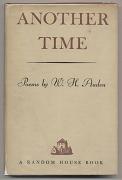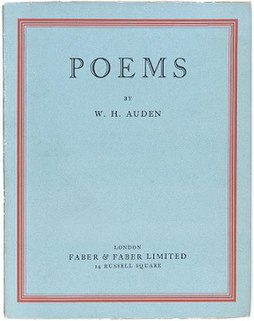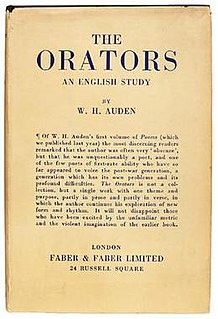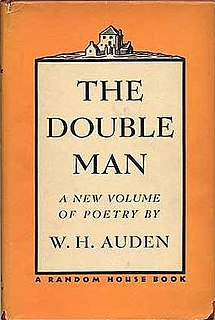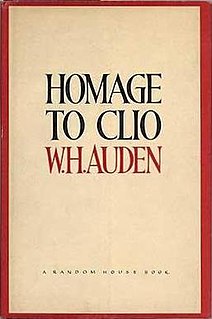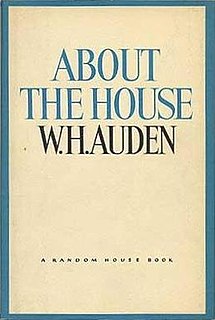First US edition (Random House) | |
| Author | W. H. Auden |
|---|---|
| Language | English |
| Genre | Poetry |
| Published | 1940 |
| Media type | |
| OCLC | 1339262 |
| 821.91 | |
| LC Class | PR6001.U4 |
Another Time is a book of poems by W. H. Auden, published in 1940.

Wystan Hugh Auden was an English-American poet. Auden's poetry was noted for its stylistic and technical achievement, its engagement with politics, morals, love, and religion, and its variety in tone, form and content. He is best known for love poems such as "Funeral Blues", poems on political and social themes such as "September 1, 1939" and "The Shield of Achilles", poems on cultural and psychological themes such as The Age of Anxiety, and poems on religious themes such as "For the Time Being" and "Horae Canonicae".
This book contains Auden's shorter poems written between 1936 and 1939, except for those already published in Letters from Iceland and Journey to a War. These poems are among the best-known of his entire career.
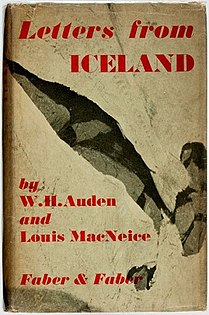
Letters from Iceland is a travel book in prose and verse by W. H. Auden and Louis MacNeice, published in 1937.
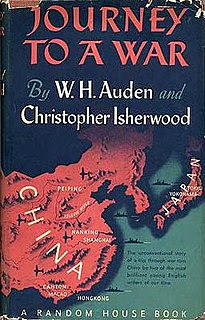
Journey to a War is a travel book in prose and verse by W. H. Auden and Christopher Isherwood, published in 1939.
The book is divided into three parts, "People and Places", "Lighter Poems", and "Occasional Poems".
"People and Places" includes "Law, say the gardeners, is the sun", "Oxford", "A. E. Housman", "Edward Lear", "Herman Melville", "The Capital", "Voltaire at Ferney", "Orpheus", "Musée des Beaux Arts", "Gare du Midi", "Dover", and many other poems.

"Musée des Beaux Arts" is a poem written by W. H. Auden in December 1938 while he was staying in Brussels, Belgium with Christopher Isherwood. It was first published under the title "Palais des beaux arts" in the Spring 1939 issue of New Writing, a modernist magazine edited by John Lehmann. It next appeared in the collected volume of verse Another Time, which was followed four months later by the English edition. The poem's title derives from the Musées Royaux des Beaux-Arts de Belgique in Brussels, famous for its collection of Early Netherlandish painting. Auden visited the Musée and would have seen a number of works by the "Old Masters" of his second line, including Pieter Bruegel the Elder
"Lighter Poems" includes "Miss Gee", "O tell me the truth about love", "Funeral Blues", "Calypso", "Roman Wall Blues", "The Unknown Citizen", "Refugee Blues", and other poems.
"Funeral Blues" or "Stop all the clocks" is a poem by W. H. Auden. An early version was published in 1936, but the poem in its final, familiar form was first published in The Year's Poetry.
"The Unknown Citizen" is a poem written by W. H. Auden in 1939, shortly after he moved from England to the United States. The poem was first published on January 6, 1940 in The New Yorker, and first appeared in book form in Auden's collection Another Time . The poem is the epitaph of a man identified only by a combination of letters and numbers somewhat like an American Social Security number ("JS/07/M/378"), who is described entirely in external terms: from the point of view of government organizations such as the fictional "Bureau of Statistics." The speaker of the poem concludes that the man had lived an entirely average, therefore exemplary, life. The poem is a satire of standardization at the expense of individualism. The poem is implicitly the work of a government agency at some point in the future, when modern bureaucratizing trends have reached the point where citizens are known by arbitrary numbers and letters, not personal names.
"Refugee Blues" is a poem by W. H. Auden, written in 1939, one of a number of poems Auden wrote in the mid- to late-1930s in blues and other popular metres, for example the meter he used in his love poem "Calypso", written around the same time. The poem dramatizes the condition of Jewish refugees from Nazi Germany in the years before World War II, especially the indifference and antagonism they faced when seeking asylum in the democracies of the period. In some later editions of Auden's poetry, the poem is not identified by name but is the first of ten poems grouped together in "Ten Songs", which also includes the above-mentioned "Calypso".
"Occasional Poems" includes "Spain 1937", "In Memory of W. B. Yeats", "September 1, 1939", "In Memory of Sigmund Freud", and other poems.

Spain is a poem by W. H. Auden written after his visit to the Spanish Civil War. Spain was described by George Orwell as "one of the few decent things that have been written about the Spanish war". It was written and published in 1937. Auden donated all the profits from the sale of Spain to the Spanish Medical Aid Committee.
"September 1, 1939" is a poem by W. H. Auden written on the occasion of the outbreak of World War II. It was first published in The New Republic issue of 18 October 1939, and was first published in book form in Auden's collection Another Time (1940).
The book is dedicated to Chester Kallman.
